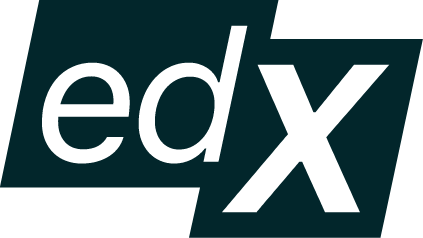Career Pathways
Fintech
Fintech, or financial technologies, includes innovations like mobile payment apps, peer-to-peer lending, cryptocurrencies, blockchain, and robo-advisors. The increasing advancement and adoption of these technologies drive up the demand for fintech-skilled professionals. If you’re enthusiastic about blending finance and technology to revolutionize money management for individuals and organizations, the fintech sector might be an ideal fit.

Growing industry
According to Statista, investment into the fintech sector has surged over the past decade, with global investment reaching $247.2 billion dollars in 2021.
Positive impact
Several fintech companies are enhancing financial inclusion by leveraging technology to expand access to financial services.
Innovative workplace
New technologies are challenging financial norms. This is a space for people who appreciate transformation.

Eric Cadena, Data Scientist
Play the clip below to hear Eric Cadena, a Data Scientist, explain how his fintech skills have proved useful across several industries.
I was at a small start up doing finance work.
And then after that, when I transitioned to the consulting company, I, wasn’t deployed into finance anymore.
The skills were very much useful and could be agnostic to any field. So I was able to get into.
Material and chemical sciences field and then right now I’m actually in oil and gas and essentially the energy field.
And again all my skills applicable even the finance side of times because I have to worry about managing the finances of a project and all that.
So. By and large, the skills are still very useful.
Discover your career opportunities
Building and managing fintech products and companies requires a diverse range of expertise and skill. You’ll find that this diversity is reflected in the array of job titles you’ll encounter within the fintech industry. Below are a few job titles to consider:
| Entry level | Mid level | Senior level | Entrepreneurial |
|
| App Developer | ||||
| Blockchain Developer | ||||
| Business Development Manager | ||||
| Business Intelligence Analyst | ||||
| Chief Financial Officer | ||||
| Chief Technology Officer | ||||
| Compliance Expert | ||||
| Cybersecurity Analyst | ||||
| Data Analyst | ||||
| Data Scientist | ||||
| Financial Analyst | ||||
| Financial Services Strategist | ||||
| Product Manager | ||||
| Quantitative Developer | ||||
| Quantitative Trader | ||||
| Risk & Control Manager |
Learn about topics in fintech
Register for a course on edX to learn about a variety of topics within the fintech industry.
How can I acquire fintech skills and turn them into a career?
If you are interested in pursuing your own career in fintech, we recommend taking these steps:
Research is key in any career, and a career in fintech is certainly no exception. Take advantage of all the information available, whether browsing the internet for job titles, listening to tech-relevant podcasts, or getting connected to professionals in the areas or positions that interest you.
One key part of the research phase is networking. This simple step is often overlooked and undervalued but can significantly impact your career trajectory. To clarify your career goals and aspirations, you must talk with professionals about what the work looks like.
You open a door of opportunity in your career by reaching out to professionals in your targeted fields, positions, and companies. Connecting with fintech professionals who could vouch for you and provide hard-to-find intel about the industries or organizations of interest is invaluable.
Check out our Networking guide and Networking outreach samples for help getting started.
To supplement your understanding of what others are doing professionally, gain clarity on your goals and aspirations. Ask yourself what about fintech interests you — the possibilities are endless.
Your career goals may necessitate primarily finance skills, primarily technology skills, or a blend of both. Below is a list of in-demand skills within each category.
Finance skills
- Financial analysis
- Financial modeling
- Financial ratios
- Financial trading fundamentals
- Forecasting
- Risk management
Technology skills
- Blockchain
- Cybersecurity
- Data analysis
- Data visualization
- Machine learning
- Python
- SQL
When it comes to acquiring fintech skills, you have numerous options. We recommend selecting a path that aligns best with your needs and learning style. Here are a few options to consider:
Self-education — If you are looking to learn asynchronously, informally, or casually, self-education is a great place to start. Many approaches to self-education support various career goals, budgets, learning styles, and time commitments. Here are some ways to self-educate:
- Informal opportunities: Gain a greater understanding of the industry by reading. Explore books, articles, and even research papers to expand your fintech knowledge and learn what’s happened or is happening in the field. Not a reader? Plenty of videos, podcasts, and other forms of multimedia can teach you a thing or two about careers or work related to fintech.
- Online Courses: If you prefer a more structured or socialized learning experience, online courses might be a good option. edX.org offers several instructor-led and self-paced courses that may be of interest.
- Professional certifications: When you want a less casual learning experience, but don’t have needs that warrant a boot camp or degree, professional certifications may be the best fit for you. Professional certifications are a great addition to your resume and prove your technical skills for roles in fintech. edX.org offers many certificate programs that may interest you.
Boot camps — Experienced curriculum teams design these innovative programs to help you achieve your career goals in a fraction of the time it takes to complete a traditional degree. With many boot camps lasting just 3-12 months, you’ll be amazed at how quickly you can gain the knowledge and expertise you need to launch your dream career. Explore popular Fintech boot camps on edX.org.
Degree programs — A degree in finance, business, computer science, or data science sets a strong foundation for a career in fintech. A degree can be especially helpful if you are pursuing mid-level or senior level roles, such as Data Scientist or Product Manager.
If you decide to focus on technical roles in the fintech industry, it is important to note that the technical hiring process is different from those of non-technical fields in two ways:
- Many employers require a portfolio of projects, such as course projects, personal projects, and professional projects. You’ll want to build a competitive online portfolio highlighting your skills and unique value.
- Many technical hiring processes involve a technical screening. This is a stage in the interview process where the employer assesses a candidate’s technical skills. They might sound intimidating at first but remember that the employer wants you to succeed. They hope to find a great candidate, and that candidate could be you.
Once you achieve your fintech career goal, celebrate your success. The career journey is full of ups and downs; every victory deserves acknowledgment.
With that said, your journey doesn’t end here — it’s only just beginning. Give yourself grace and understand that careers are not linear. Here are some ways you could continue growing your fintech skills.
Continued learning — Always reference our course catalog on edX.org for continued learning opportunities. It never hurts to brush up on your skills, expand your knowledge within the industry, or learn about other subjects that could apply to your work, interests, or something in between.
Promotions — As the fintech industry grows, so will career opportunities. To position yourself well for promotions, you will need to stay current on fintech technologies and trends and develop leadership skills.
Chief financial officer — Oversees an organization’s financial activities, including financial planning, budgeting, reporting, and risk management.
Chief technology officer — Oversees an organization’s technological vision, strategy, and direction.
Quantitative developer — Creates and maintains software systems and algorithms used in quantitative finance and trading.
Pivots — Make sure to regularly check in with yourself and your satisfaction with daily tasks. If you are dissatisfied in your current role, take stock of what you like and dislike about it, keep your eyes out for company-sponsored growth opportunities, and pursue career pivots that optimize your background, skill set, and interests.
What are my next steps?
Start learning now
Register for a course on edX to learn about a variety of topics within the field of fintech.
Watch a session
Watch a relevant session on our Events Page to learn more about the industry and other professional’s experiences within it.
AI + Web3 technology
Curious about AI + Web3? Web3 has become a catch-all term for the vision of a new, better internet. At its core, Web3 uses blockchains, cryptocurrencies, and NFTs to give power back to the users in the form of ownership. Now AI adds new powers to this Web3 world. Our special guest, Scott Meyer, VP…

Designing for financial success: harnessing the power of fintech and UX design
In this webinar, we delve into the importance of user experience (UX) design in creating financial products, discover industry trends, and provide valuable insights into the ever-evolving job market. Our speaker Saurabh Bose is the Principal UX Designer at Backbase and has over 15 years of experience in designing innovative design solutions and entrepreneurial projects.…

Fintech voyages: Navigating & uncovering opportunities in the digital finance landscape
View this webinar to learn about the dynamic intersection of technology and finance, where we will discuss the industry’s latest trends, innovations, and disruptions. Key Takeaways The views and opinions expressed in this video are those of the presenter and do not necessarily represent the view of edX or its parent company 2U, Inc.















